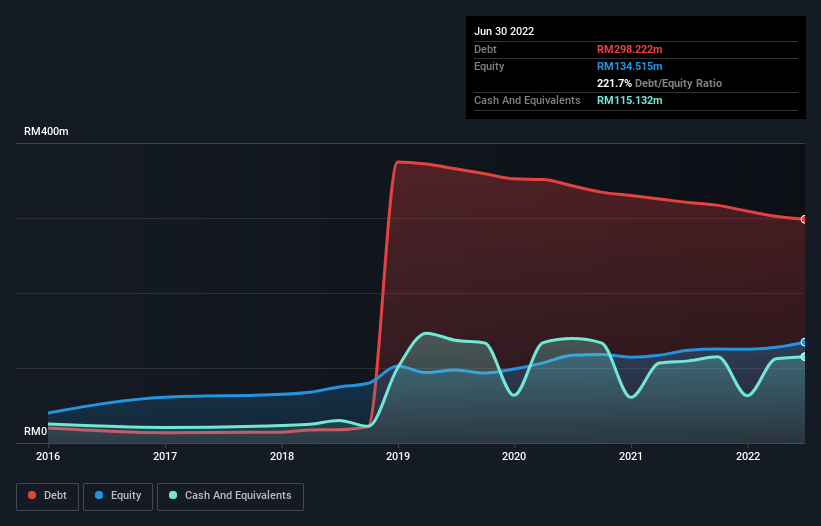- Malaysia
- /
- Commercial Services
- /
- KLSE:GFM
These 4 Measures Indicate That GFM Services Berhad (KLSE:GFM) Is Using Debt Extensively

Warren Buffett famously said, 'Volatility is far from synonymous with risk.' It's only natural to consider a company's balance sheet when you examine how risky it is, since debt is often involved when a business collapses. We can see that GFM Services Berhad (KLSE:GFM) does use debt in its business. But should shareholders be worried about its use of debt?
What Risk Does Debt Bring?
Debt and other liabilities become risky for a business when it cannot easily fulfill those obligations, either with free cash flow or by raising capital at an attractive price. In the worst case scenario, a company can go bankrupt if it cannot pay its creditors. While that is not too common, we often do see indebted companies permanently diluting shareholders because lenders force them to raise capital at a distressed price. Having said that, the most common situation is where a company manages its debt reasonably well - and to its own advantage. When we examine debt levels, we first consider both cash and debt levels, together.
See our latest analysis for GFM Services Berhad
What Is GFM Services Berhad's Debt?
You can click the graphic below for the historical numbers, but it shows that GFM Services Berhad had RM298.2m of debt in June 2022, down from RM320.7m, one year before. On the flip side, it has RM115.1m in cash leading to net debt of about RM183.1m.

How Healthy Is GFM Services Berhad's Balance Sheet?
According to the last reported balance sheet, GFM Services Berhad had liabilities of RM57.7m due within 12 months, and liabilities of RM314.3m due beyond 12 months. Offsetting these obligations, it had cash of RM115.1m as well as receivables valued at RM35.1m due within 12 months. So its liabilities outweigh the sum of its cash and (near-term) receivables by RM221.7m.
The deficiency here weighs heavily on the RM83.4m company itself, as if a child were struggling under the weight of an enormous back-pack full of books, his sports gear, and a trumpet. So we definitely think shareholders need to watch this one closely. At the end of the day, GFM Services Berhad would probably need a major re-capitalization if its creditors were to demand repayment.
In order to size up a company's debt relative to its earnings, we calculate its net debt divided by its earnings before interest, tax, depreciation, and amortization (EBITDA) and its earnings before interest and tax (EBIT) divided by its interest expense (its interest cover). The advantage of this approach is that we take into account both the absolute quantum of debt (with net debt to EBITDA) and the actual interest expenses associated with that debt (with its interest cover ratio).
While GFM Services Berhad's debt to EBITDA ratio (4.7) suggests that it uses some debt, its interest cover is very weak, at 1.9, suggesting high leverage. It seems clear that the cost of borrowing money is negatively impacting returns for shareholders, of late. More concerning, GFM Services Berhad saw its EBIT drop by 9.1% in the last twelve months. If that earnings trend continues the company will face an uphill battle to pay off its debt. There's no doubt that we learn most about debt from the balance sheet. But you can't view debt in total isolation; since GFM Services Berhad will need earnings to service that debt. So if you're keen to discover more about its earnings, it might be worth checking out this graph of its long term earnings trend.
Finally, a business needs free cash flow to pay off debt; accounting profits just don't cut it. So we always check how much of that EBIT is translated into free cash flow. During the last three years, GFM Services Berhad produced sturdy free cash flow equating to 72% of its EBIT, about what we'd expect. This cold hard cash means it can reduce its debt when it wants to.
Our View
On the face of it, GFM Services Berhad's interest cover left us tentative about the stock, and its level of total liabilities was no more enticing than the one empty restaurant on the busiest night of the year. But on the bright side, its conversion of EBIT to free cash flow is a good sign, and makes us more optimistic. We're quite clear that we consider GFM Services Berhad to be really rather risky, as a result of its balance sheet health. For this reason we're pretty cautious about the stock, and we think shareholders should keep a close eye on its liquidity. The balance sheet is clearly the area to focus on when you are analysing debt. However, not all investment risk resides within the balance sheet - far from it. For example GFM Services Berhad has 4 warning signs (and 2 which are concerning) we think you should know about.
If, after all that, you're more interested in a fast growing company with a rock-solid balance sheet, then check out our list of net cash growth stocks without delay.
New: Manage All Your Stock Portfolios in One Place
We've created the ultimate portfolio companion for stock investors, and it's free.
• Connect an unlimited number of Portfolios and see your total in one currency
• Be alerted to new Warning Signs or Risks via email or mobile
• Track the Fair Value of your stocks
Have feedback on this article? Concerned about the content? Get in touch with us directly. Alternatively, email editorial-team (at) simplywallst.com.
This article by Simply Wall St is general in nature. We provide commentary based on historical data and analyst forecasts only using an unbiased methodology and our articles are not intended to be financial advice. It does not constitute a recommendation to buy or sell any stock, and does not take account of your objectives, or your financial situation. We aim to bring you long-term focused analysis driven by fundamental data. Note that our analysis may not factor in the latest price-sensitive company announcements or qualitative material. Simply Wall St has no position in any stocks mentioned.
About KLSE:GFM
GFM Services Berhad
An investment holding company, provides integrated facilities management, facility, and advisory services to primarily in Malaysia.
Good value with proven track record and pays a dividend.


